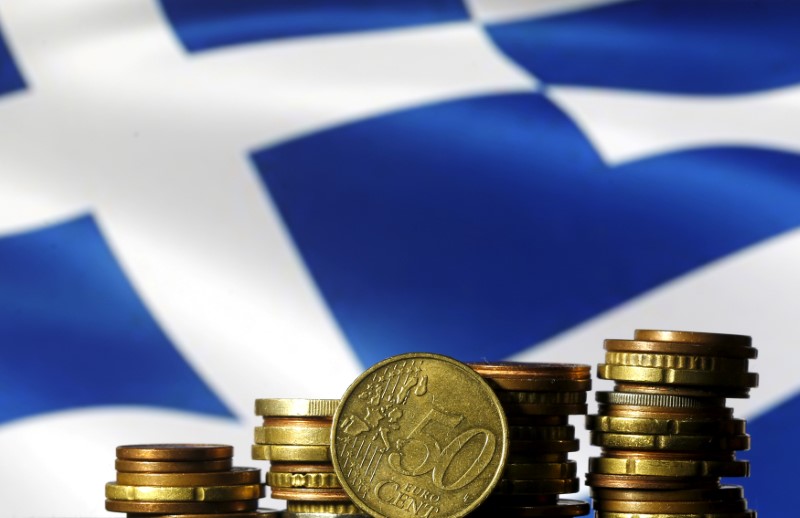 © Reuters. Euro coins are seen in front of a displayed Greece flag in this picture illustration
© Reuters. Euro coins are seen in front of a displayed Greece flag in this picture illustrationBy Francesco Guarascio and Jan Strupczewski
BRUSSELS (Reuters) – Euro zone finance ministers will decide next month on all measures, including further debt relief, needed for Greece to exit its bailout successfully, their chairman said on Thursday.
Greece is due to exit the rescue program – its third since 2010 – in August, and its partners in the bloc are anxious to ensure it can do so on a financially sustainable basis.
“We will decide on all that is needed to ensure a successful exit …by August. This is our top priority regarding Greece,” Eurogroup head Mario Centeno told a news conference.
For the June 21 talks to be successful, Athens has to pursue the last reforms agreed with euro zone creditors to put its economy on a firmer growth path. “That is a crucial element for the conclusion of the program,” he said.
If Greece delivers on the final batch of reforms, the euro zone will be able to disburse new loans that will not only cover its immediate needs, but also create a cash buffer to keep it liquid after the bailout ends.
While the amount of that last disbursement has not been decided, euro zone lenders want it to keep Greece covered for 12 to 18 months. This would help the country return to debt markets more easily after it was cut off in 2010.
Euro zone lenders, Greece’s biggest creditors, are also set to decide in June what form of debt relief to grant Greece.
The ministers asked the euro zone bailout fund ESM, the European Commission and the European Central Bank on Thursday to prepare a debt sustainability analysis to inform their discussions.
The debt relief offer, which would need to act as an incentive for Athens not to backtrack on reforms and stick to a prudent fiscal policy, is likely to include some debt relief up front and some spread over time.
Debt servicing would be linked to GDP – the faster the Greek economy expands, the higher the repayments, euro zone finance ministers have said.
Because Greece will not have used all the money earmarked for it in its latest bailout, possibly up to 27 billion euros, some funds could be used by the euro zone to replace much more expensive IMF loans to Greece with its own, cheaper credit.
While there has been no discussion of a reduction of the nominal value of the Greek debt, Greece might also receive back the profits made by euro zone national central banks on their portfolios of Greek bonds and see maturities and grace periods on euro zone loans extended.
Fusion Media or anyone involved with Fusion Media will not accept any liability for loss or damage as a result of reliance on the information including data, quotes, charts and buy/sell signals contained within this website. Please be fully informed regarding the risks and costs associated with trading the financial markets, it is one of the riskiest investment forms possible.
Source: Investing.com





























